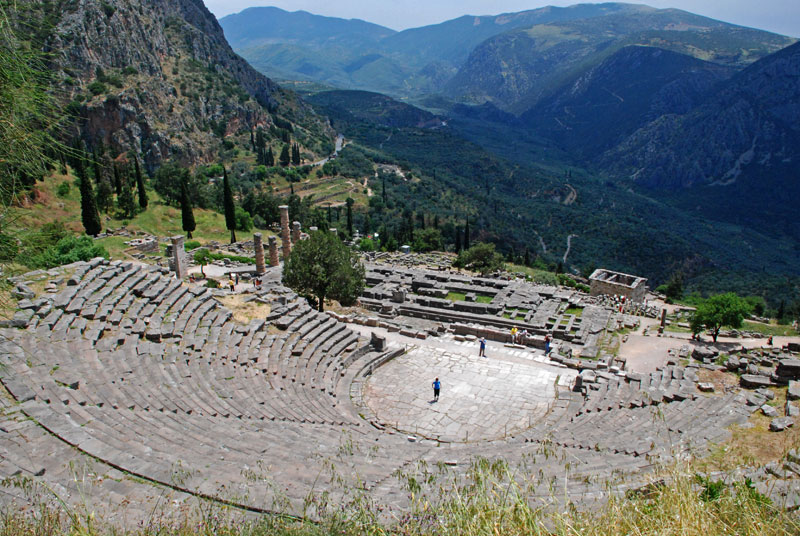
Survey of Greek Literature

The Theater in Delphi, Greece. In the background are the foundation and standing columns of the
Temple of Apollo, and beyond that (to the right) is the small Treasury of the Athenians.
We'll be concentrating on reading undiluted Greek this semester. This class assumes that you have completed your study of Greek grammar using Oxford's Athenaze I and II, or an equivalent text.
Class Email List
Communications to the class will be sent from the registration database at The Lukeion Project. You are responsible for making sure we have your most current email address. Students and parents will be copied on any class emails. You are responsible for anything sent to the entire class via the class email list, even if you did not receive it because you failed to provide us with your current email address.
Class Documents
Class Format
The goal of a reading course is to do just that: READ GREEK! Nothing will increase your proficiency faster than plowing your way headfirst through some serious Greek texts. So you will prepare texts for translation and discussion prior to the class session. During class we'll discuss the background of the author and may take time to note characteristics and idiosyncrasies of his Greek; but we'll spend our time translating.
I’ve chosen texts that give you a lot of help – not just with vocabulary, but also with some of the more obscure points of grammar. This means that you shouldn’t have to spend a great deal of time in a Greek-English lexicon, and can instead focus on reading Greek. In addition, I'm going to share some resources with you that if used properly, will speed your acquisition of Greek. If abused, however, they'll slow your progress and make you dependent on them. The goal is to learn the text well and to fully understand it using nothing but the Greek itself by the time you get to class.
Course Expectations and Requirements
- Attend class on time each week
- Prepare the assigned passage; be able to translate the passage and explain the grammar
- Complete assigned homework and submit it through Quia on time each week
- Take quizzes and exams on time as assigned
Textbooks
- Required:
- A Greek Anthology by JACT (Cambridge University Press, 2002)
- Optional:
- The Brill Dictionary of Ancient Greek by Franco Montanari, (Brill Academic Pub, 2015) - Although this is pricey ($125), it’s still less than the so-called “Great Scott,” or unabridged version of the Lexicon listed below. It is scholarly, extensive, more modern, and easier to read than Liddell & Scott’s massive tome. I use it regularly. For the Classics student who’s looking for a complete Greek Lexicon, this is a great option.
- An Intermediate Greek-English Lexicon by Liddell and Scott, 7th ed. (Oxford University Press, 1945) - For years, this was the standard Greek lexicon if you didnn't have the "Great Scott"
- Introduction to Attic Greek by Donald J. Mastronarde, 2nd ed. (University of California Press, 2013) - This is the book that I often use as a reference grammar. I find it more detailed than Athenaze, and its Index and Contents are easier to use. It isn't quite as comprehensive as Smyth (below), but is easier to use.
- Greek Grammar by Herbert Weir Smyth (Harvard University Press, 1984) - This is reprinted from the 1920 edition, and is considered by many to be the gold standard authority on Greek Grammar. It can be a little difficult to use, partly because the wonders of modern computer-assisted typesetting and layout were not yet available, but it is comprehensive and it cites examples from throughout Greek literature. If you want the granddaddy grammar, choose this over Mastronarde (above).
Fonts
The default font in Quia (Arial Unicode MS) can be difficult to read. We will use the IFAO-Grec Unicode font. You MUST have this font installed on your computer for the Greek characters to display properly in the homework and quizzes - the link to the download page is below. Even so, Quia will use its default font on any of your answer entry boxes; I cannot change that.
|
|